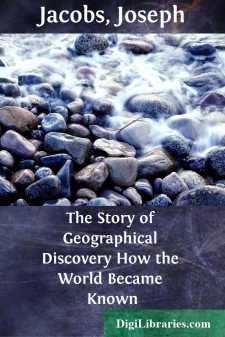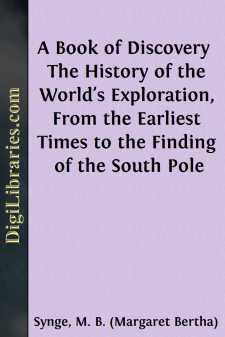Non-Classifiable
- Non-Classifiable 1768
Non-Classifiable Books
Sort by:
CHAPTER I.INTRODUCTORY. Why this Treatise does not contain all Knowledge.—Attention of Scientific Men attracted to Drainage.—Lieutenant Maury's Suggestions.—Ralph Waldo Emerson's Views.—Opinions of J. H. Klippart, Esq.; of Professor Mapes; B. P. Johnston, Esq.; Governor Wright, Mr. Custis, &c.—Prejudice against what is English.—Acknowledgements to our Friends at Home and...
more...
Detailed Contents. Chapter I. Donner LakeA Famous Tourist ResortBuilding the Central PacificCalifornia's Skating ParkThe PioneersThe Organization of the Donner PartyHo! for California!A Mammoth TrainThe Dangers by the WayFalse Accounts of the Sufferings EnduredComplete Roll of the CompanyImpostors Claiming to Belong to the PartyKilled by the PawneesAn Alarmed CampResin IndiansA Mother's Death...
more...
CHAPTER I YOUTH AND THE WEST The ten years of American history from 1850 to 1860 have a fascination second only to that of the four years which followed. Indeed, unless one has a taste for military science, it is a question whether the great war itself is more absorbing than the great debate that led up to it; whether even Gettysburg and Chickamauga, the March to the Sea, the Wilderness, Appomattox,...
more...
by:
William Gardner
Douglas was now at the zenith of his success, master of all his resources, the most admired, dreaded and powerful man in American public life. History must inexorably condemn much of his most brilliant and successful work, but the very emphasis of its condemnation is an involuntary tribute to the matchless efficiency of the man. At this period he was the most masterful and commanding personage of...
more...
PREFACE. The practice of beginning the study of geography with the locality in which the pupil lives, in order that his first ideas of geographical conceptions may be gained from observation directed upon the real conditions existing about him, has been steadily gaining adherence during the past few years as a rational method of entering upon the study of geography. After the pupil has finished an...
more...
by:
Joseph Jacobs
INTRODUCTION How was the world discovered? That is to say, how did a certain set of men who lived round the Mediterranean Sea, and had acquired the art of recording what each generation had learned, become successively aware of the other parts of the globe? Every part of the earth, so far as we know, has been inhabited by man during the five or six thousand years in which Europeans have been storing up...
more...
INTRODUCTION Such was the spirit in which the exploration of the world was accomplished. It was the inspiration that carried men of old far beyond the sunrise into those magic and silent seas whereon no boat had ever sailed. It is the incentive of those to-day with the wander-thirst in their souls, who travel and suffer in the travelling, though there are fewer prizes left to win. But "To travel...
more...
by:
Samuel McHarry
When I first entered on the business of Distilling, I was totally unacquainted with it. I was even so ignorant of the process, as not to know that fermentation was necessary, in producing spirits from grain. I had no idea that fire being put under a still, which, when hot enough, would raise a vapour; or that vapour when raised, could be condensed by a worm or tube passing through water into a liquid...
more...
by:
John Morley
There was a moment in the last century when the Gallican church hoped for a return of internal union and prosperity. This brief era of hope coincided almost exactly with the middle of the century. Voltaire was in exile at Berlin. The author of the Persian Letters and the Spirit of Laws was old and near his end. Rousseau was copying music in a garret. The Encyclopædia was looked for, but only as a...
more...
by:
John Morley
CHAPTER I.OTHER DIALOGUES. We may now pass to performances that are nearer to the accepted surface of things. A short but charming example of Diderot’s taste for putting questions of morals in an interesting way, is found in the Conversation of a Father with his Children (published in 1773). This little dialogue is perfect in the simple realism of its form. Its subject is the peril of setting one’s...
more...











